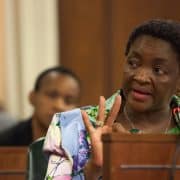|
Getting your Trinity Audio player ready...
|
It’s been called “Sassa-gate” for all the right reasons: a government crisis characterised by several weeks of blame games; political backbiting; forensic investigations revealing unlawful information peddling; and even lawsuit threats. It is a situation that many South Africans would hate to see repeated in the future.
After weeks of tension and anxiety, relief came with a Constitutional Court ruling that ensured that social grants would be paid in full and on time to 17-million South Africans who depend on them, come 1 April 2017. The real victory for governance and accountability is that the court put never-seen-before administrative pressures on those responsible for the distribution grants – the South African Social Security Agency (Sassa) and its contractor Cash Paymaster Services (CPS) – by extending the contract for 12 months. Social development minister Bathabile Dlamini is personally answerable to the court for ensuring that the all-important service that her department is responsible for is rendered smoothly with no room for undue profiting.
“The Court declared that Sassa and CPS are under a constitutional obligation to ensure payment of social grants to grant beneficiaries from 1 April 2017 until an entity other than CPS is able to do so and that a failure to do so will infringe upon the rights of grant beneficiaries of access to social assistance under section 27(1)(c) of the Constitution,” reads the court’s judgment.
The court put further conditions on the contract, which are “aimed at ensuring accountability, transparency and protection of the beneficiaries’ personal information.” Investigative body amaBhungane revealed on the eve of the judgment that CPS’s parent company, US-listed firm Net1, uses the social grant contract as a secret backdoor to obtain grant beneficiaries’ information. “This was always forbidden. Then Net1 uses the information to make billions selling loans, insurance and other financial products to beneficiaries,” reads the report. “This gives Net1 an information edge over its peers when it lends money or sells insurance and other products, because it can sign up customers with no paperwork and almost zero risk of bad loans.”
Keeping an eye on progress
The court further instructed Dlamini and Sassa to file a progress report on a quarterly basis which stipulates plans to ensure the payment of social grants after the expiry of the 12-month extension period. The order also made provision for the involvement of the Auditor-General to evaluate the implementation of the interim contract.
Until the moment of the judgment on Friday, there had been uncertainty and no shortage of spectacle over the ineptitude of Sassa in carrying out the task of payouts beyond 31 March, when its current contract with CPS ends. CPS has been distributing grants since 2012, but the contract was declared invalid in 2013 by the Constitutional Court, which later ordered Sassa to reopen the bidding process to allow for other companies to compete for the contract.
The agency did as it was told – albeit remaining with CPS in the interest of avoiding service disruptions – but abandoned the process in 2015, saying it would develop its own distribution mechanisms instead of outsourcing.
With nothing to show for this development, Sassa started knocking on the door of National Treasury in late 2016, to negotiate for a deviation procedure that could secure it an extension of the contract without contravening the Constitutional Court ruling. It had taken the agency over a year to disclose that it would not be ready to take over from CPS at the beginning of April 2017. It was at this point that Parliament got involved, to get answers, but not without a few dramatic hiccups. What followed was an avalanche of untidy mishaps that revealed a lot more than the players in Sassa-gate would have imagined.
Sassa CEO Thokozani Magwaza told Parliament’s Standing Committee on Public Accounts (Scopa) in November last year that the agency could go ahead with the insourcing process, but acknowledged that “there are things that they will have to outsource such as banking because they do not have a banking licence and security”, but registrations and administration they would be able to do. That would be his last appearance before Scopa, until earlier this month.
His absence from the hearing on 28 February so riled members of Scopa, that chairperson Themba Godi summoned Dlamini to Parliament the very next week. Social development director-general Zane Dangor reported that Magwaza was on sick leave, an explanation some Scopa members refused to accept. The feeling across the room was that Dlamini could have shown leadership in the absence of Magwaza, who, newspaper reports purported, had been suspended for defying Dlamini by throwing in the South African Post Office as a possible rescuer of the crisis. Dangor himself resigned four days later, citing a breakdown of relations with Dlamini over the crisis, according to the Mail & Guardian.
The most charged week of Sassa-gate, however, started off with a letter landing in the inbox of Corruption Watch executive director David Lewis on 10 March. It was from legal representatives of CPS. According to them, Lewis had defamed their client in recent utterances on the matter of Sassa. They wanted him to publicly retract statements in which inferences were made about the company engaging in corrupt conduct. Failure to do so, they said, might lead to them filing a lawsuit. Corruption Watch responded by defending the merits of Lewis’s points and pointing out the public interest element of CPS’s work. Thus Lewis’s name joined several others believed by CPS CEO Serge Belamant to be determined to tarnish the name of his company.
ConCourt takes drastic steps
Fast forward to a week later, and the Constitutional Court did the only thing it could under the circumstances. It essentially put the Sassa/CPS contract under administration, declaring that CPS will continue to distribute the grants for another year, but it would not be business as usual. They would gain no profit from this arrangement, and if the company happens to incur loss, it was ordered to make details of this available to Treasury, which would in turn inform the court.
The matter of Black Sash vs the Minister of Social Development brought to the fore the complex way in which the private sector at times sets the terms for how government spends in contracts. It was during the submissions of CPS senior counsel Andrew Cockrell that Chief Justice Mogoeng Mogoeng asked frankly if the company only sought to make a notable profit from an extension of a contract with Sassa. It did not matter how much Cockrell tried to manoeuvre around the response to that question, it had become clear that profit was the bottom line and South Africa’s taxpayers were to foot the bill.
Black Sash brought the matter to the Constitutional Court following months of dilly-dallying by Sassa over the plans beyond the expiry of the current CPS contract at the end of March. In what has been described across many platforms as a self-created crisis, the management of Sassa had told Parliament that there had been talks with CPS to determine a way forward after the end of the existing contract. Dlamini, however, had cited a stalemate, blaming Treasury for delaying a process that was meant to mitigate a looming crisis.
Her finance counterpart Pravin Gordhan later told Scopa that there was no way Treasury would undergo negotiations over the terms of a contract that was already declared unlawful back in 2014. Any deviation measure entered into would have to be approved by the Constitutional Court, said Gordhan. “Deviations could be applied for in exceptional cases such as natural disasters and if there was a sole supplier of services or goods, but there were regulations about how a department should manage procurement from a sole supplier,” he said. “The role of Treasury in procurement is to set standards and frameworks and to give approvals, but only after the normal process had been followed.”
On the same day that Gordhan and his team presented their side of the story to Scopa, acting Sassa CEO Wiseman Magasela was meant to submit an explanation to the Constitutional Court for why his office had failed to submit the agency’s application to Treasury for deviation. Although news reports said he missed the deadline by some minutes, sparking outrage at either incompetence or sheer arrogance displayed by Sassa, the social development department later released a statement that contrary to media reports, the affidavits were filed timeously and their copies were stamped by the clerk of the Court and handed to the Sassa legal team.
Meanwhile, Scopa members expressed concern at the way the Treasury session left them with more questions than answers. The IFP’s Mkhokheli Hlengwa said Treasury had unleashed confusion on the matter, despite their attempts to clarify where government stands on the issue of grants. It had become clear at this point that only a determination by the court would allow for a way forward.
Tackling capacity and consequences
At this point also, a ministerial task team led by Minister in the Presidency Jeff Radebe had been established to tackle the matter. Apart from reviewing the administrative capacity and management, the team would also tackle the issue of consequence management, said Radebe.
At the finance Scopa hearing, Treasury director-general Lungisa Fuzile gave a telling explanation of the negotiations between his team and Sassa. He emphasised that part of his job was to ensure that lines are drawn so his team’s objective role is pre-determined, as well as to “avoid taking over the legally assigned responsibility of another entity” (in this case Sassa). Something seemed amiss about the new terms being negotiated by Sassa with CPS, particularly on the point of cost.
Treasury, said Gordhan, had not been in a position to take part in the negotiations with CPS as the relevant procedures had not been followed by Sassa. Given the current situation of Sassa’s unreadiness to carry out the payments of social grants internally, the agency was supposed to have applied for a deviation process that allows for it to enter into a new contract with CPS.








